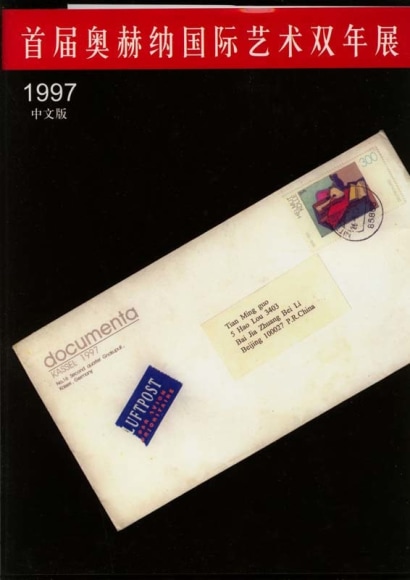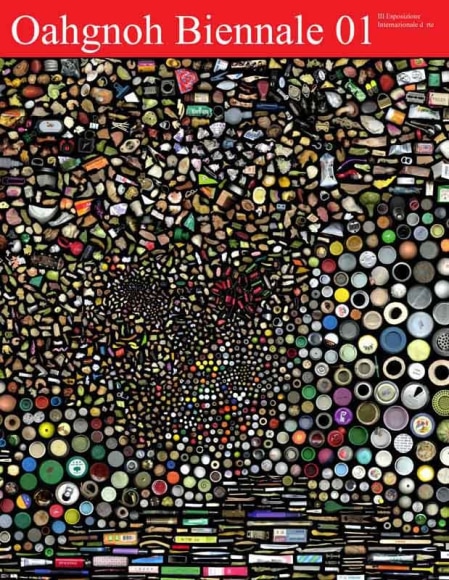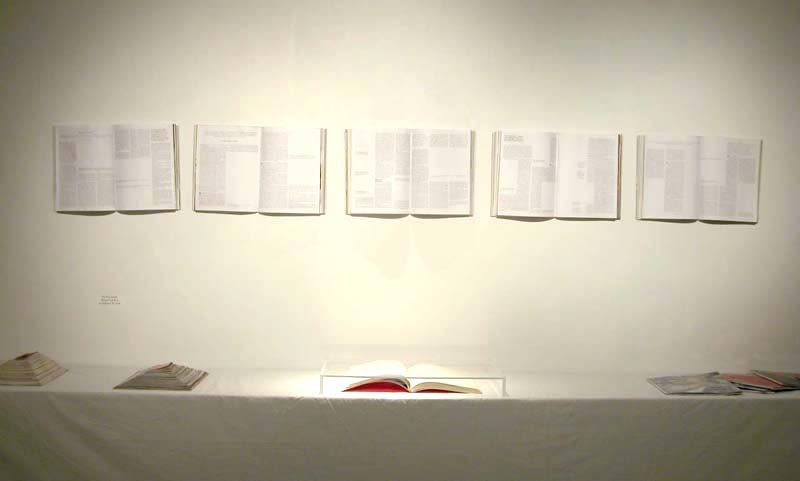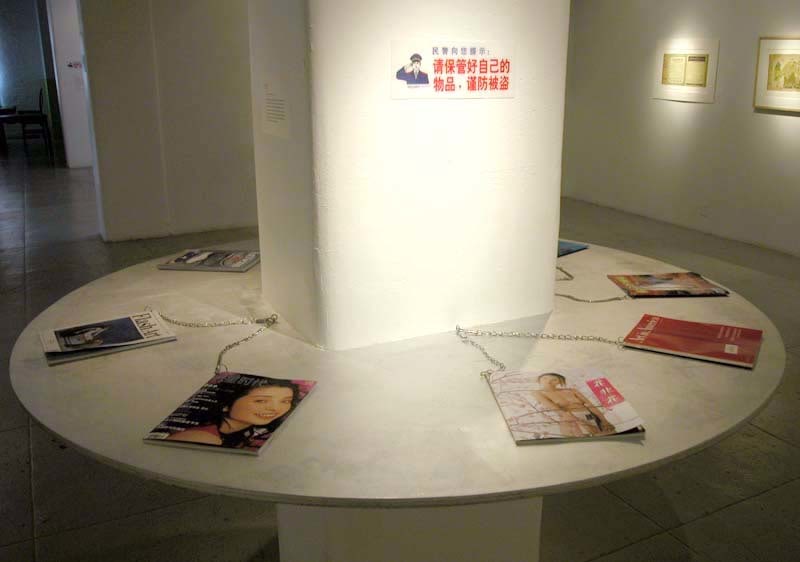Born in Beijing in 1965, Hong Hao graduated from the Printmaking department of the Academy of Fine Arts in Beijing in 1989. Although he also studied oil painting, his primary interest was always in the graphic arts and photography.
The wide range of his interests can be seen in the series of thirty-one prints known as the Selected Scriptures of Hong Hao on which he worked intermittently between 1989 and the mid-1990s. Using visual and literary quotations from a wide range of sources both ancient and modern, ranging from Sun Tzu’s Art of War to the literature of the Cultural Revolution, he ranged freely over current developments in the geopolitical and cultural spheres.
In the New Topographical World Map, for example, countries are represented according to their international status while in The Holy Caves characters from the Cultural Revolution substitute the Buddhist images in the Dunhuang caves. Using between 10 and 100 screens to achieve his effects, the trompe-l’oeil volumes are densely packed with information. He has spoken of his wish “to compile a ‘new encyclopedia,’ to put forward my own understanding of this ever-changing world.”
In a subsequent series of works Scenes from the Metropolis executed between 1999 and 2000 Hong continued to develop the multilayered approach of the Selected Scriptures, using a Song Dynasty masterpiece as the basis for his commentary on contemporary China.
The current exhibition, Hong Hao’s first one-person exhibition in the United States, is conceived as a Reading Room, a quiet public space in which books can be considered from many different viewpoints. A selection from the flattened tomes of Selected Scriptures provides the background for a display of Hong Hao’s own books published in limited editions, the traditional string-bound Selected Scriptures and two albums from Scenes from the Metropolis. Books are also the theme of a new series of sculptures in which they are considered not as purveyors of meaning but as objects that can be handled and treated in different ways.
Immersed in traditional Chinese culture and yet detached from it, meticulous in his craftsmanship but fully aware of the efficacy of computers to generate images, Hong Hao is an artist whose insights into the rapidly developing land of his birth are marked equally by admiration for the achievements of the past and pleasure in the accomplishments of the present.
前波画廊非常荣幸地在2004年3月3日推出展览《洪浩的阅读室》。这是艺术家洪浩在美国举办的第一次个人展览。洪浩1965年出生于北京,1985-89年就读于中央艺术学院版画系。毕业后他成为职业艺术家,在中国和其他国家参加了多次当代艺术展览。
从1989至1990年中期,洪浩录续地创作了三十一件版画作品, 并将此系列命名为《藏经》。我们可以从这个系列中看到洪浩将其广泛的兴趣容入于版画传统中,既保持了传统艺术的细腻手法,同时也使作品充满了幽默感。他的灵感来自于传统及现代的结合,并直接引用视觉与文学上的符号,比如《孙子兵法》和文化大革命时期的口号。在这些创作中,洪浩自由地游洄于当代不同的文化和区域层面当中。
在《世界测绘新图》系列作品中,洪浩将各国根据其国际地位身份来区别。而在《石窟》中,敦煌石窟中的佛像由文化大革命中的文字符号所代替。用洪浩自己的话说,“我希望制作一本属于自己的‘百科全书’,来表达我对变幻无穷的世界的理解。”
《清明上图》作品系列完成于1999 到2000年之间。洪浩继续使用《藏经》系列里的多层次的表现手法,借用宋朝着名的同名作品《清明上河图》为基础,来纪实当代的中国。
这次的展览将是洪浩在美国的第一次个展。构想出“阅读室”这样的题材,是用来比喻一个安静的开放式空间,可以让观众从许多不同角度来理解“书”这一概念。此次展览将包括《藏经》系列版画,及根据传统装订方式制做的限量书《藏经》和《清明上和图》等。展览中,书也被转换成一组雕刻作品,不仅是传达信息的手段,也是一件可以触摸理解的物体。
洪浩深受中国传统文化的薰陶,却能与之隔离。他注重手工技术,却又认识到电子图像的清晰性和省时性。作为一位艺术家,他既崇拜中国传统文化的成就,又对自己国家日新月异的快速发展而高兴和自豪。




